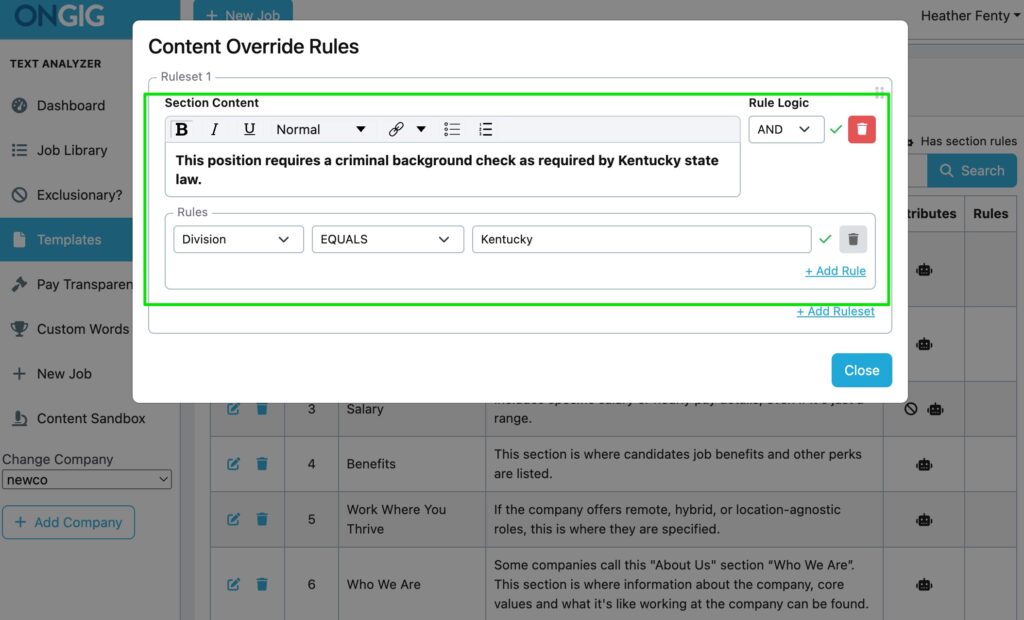- Why I Used Grok + Gemini and ChatGPT to Build My Outreach List (And How Recruiters Can Too) - January 22, 2026
- The Diversity & Inclusion Glossary — A List of 300+ Helpful Diversity Terms (2026 Update) - January 19, 2026
- Why You Need a Job Description Revision Tracker (Before Your Next Audit) - January 9, 2026
Kentucky law requires background checks for many types of employment. That means if you’re posting jobs in Kentucky, you’ve got legal requirements to follow. And if you’re hiring in multiple states, that’s a big compliance headache waiting to happen.
Let’s break down what Kentucky expects from your job postings (and how you can make compliance automatic).
Understanding Kentucky Employment Background Check Laws for Job Postings
In Kentucky, criminal background checks are required for a range of jobs, especially those involving healthcare, education, or working with vulnerable populations. For example, any role working with children, seniors, or individuals with disabilities typically triggers a state-mandated background check.
Here’s the part recruiters and TA leaders need to know:
- If a background check is legally required for the role, you must disclose it clearly in the job posting.
- You can’t omit or bury this information (candidates have the right to know before they apply).
- Failing to include this language in your job ad can create legal risk, especially if a rejected candidate challenges your process.
The Compliance Headache for Talent Acquisition
If you’re a TA leader, you’ve probably run into this already:
- Different states = different job posting requirements.
- Your legal team sends an email: “Hey, make sure Kentucky postings say XYZ.”
- You update one job, but forget three others.
This patchwork process creates risk. It’s not scalable. And it puts your recruiting team in the uncomfortable spot of trying to interpret legal requirements instead of focusing on hiring.
How to Automate Kentucky Job Posting Compliance
That’s where Ongig’s Content Override Rules come in.

Let’s say you’re hiring for roles across multiple states, including Kentucky. With Ongig, you can create a rule that says:
If the job location = Kentucky, then auto-insert the following language at the bottom of the job ad:
“This position requires a criminal background check as required by Kentucky state law.”
No more guessing. No more legal reviews slowing down postings. Just automated, compliant job ads every time.
Client Use Case: From Manual Fixes to Full Compliance
One of our clients (a multi-state healthcare provider) came to us with a problem. Their Kentucky roles were missing the required background check language. Some recruiters added it. Some didn’t. Their legal team wasn’t happy.
We set up a simple Content Override Rule. Now, every Kentucky job posting automatically includes the required disclosure. Recruiters don’t have to think about it. Legal risk = gone. Everyone’s happy.
The Takeaway for TA Leaders
Kentucky’s employment background check laws are just one example of how job posting compliance can get complicated fast. But that doesn’t mean it has to slow you down.
With the right automation in place, compliance becomes one less thing on your to-do list. And your job postings stay consistent, legal, and clear — no matter where you’re hiring.
Need help staying compliant across every state? Request a demo to see how Ongig’s Content Override Rules make it easy.
Why I Wrote This
We hear this a lot: “Our legal team flagged job postings in Kentucky for missing required language.” This blog exists because one client came to us with that exact problem. And we solved it with one rule. If you’re hiring in Kentucky, Ongig can help you stay compliant without manual effort. Let’s talk.
FAQs
1. Do Kentucky job postings have to mention background checks?
Yes, if a background check is legally required for the role, the job ad must include that information clearly.
2. Who needs background checks in Kentucky?
Healthcare workers, childcare providers, teachers, and others working with vulnerable populations are commonly subject to required checks.
3. Can I automate job posting language based on location?
Absolutely. Ongig’s Content Override Rules let you insert required language based on the job’s city, state, or even country.
4. What happens if I don’t include this language?
You could face legal or reputational risk — especially if a candidate challenges the process or if the omission violates state regulations.
5. How do I get started with compliance automation?
Request a demo and we’ll show you exactly how it works.
